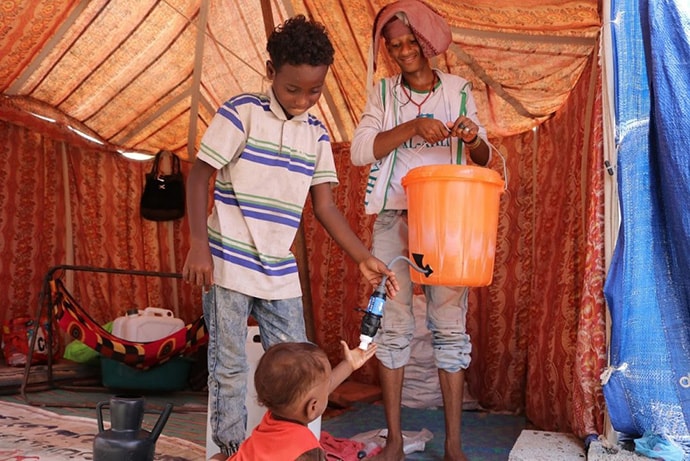Blog
Posted on July 5, 2024
By Ina Lee, Communications Director, Yemen Relief and Reconstruction Foundation

Water filters distributed in an Internally Displaced Camp in Aden, Yemen. Photo: YRRF
Imagine waking up every day, unsure if the water you drink will make you sick. For millions in Yemen, a country ravaged by conflict and a severe water crisis, this is a harsh reality. The Yemen Relief and Reconstruction Foundation (YRRF) is working to change this narrative, striving to make clean water accessible to everyone. In alignment with the United Nations Sustainable Development Goal 6 (SDG6) – Clean Water and Sanitation, YRRF is dedicated to ensuring that all Yemeni people have reliable access to clean water.
Continue Reading
Posted on July 1, 2024
By Tracey Compton, Senior Media and Communications Coordinator

Image created by GlobalWA with OpenArt.ai
The coming “youthquake” in Africa is well-documented. Reports indicate Africa will account for two out of every five children born on the planet. According to The New York Times analysis of UN World Population Prospects, Africa will have the world’s largest workforce, surpassing China and India within the next decade – yet there remains a lagging focus on job creation on the continent. Historically, employment programming has focused on job skills training or seed money to start businesses. But what can you do when there aren’t enough jobs for the growing population and training more people only creates a larger pool of higher-skilled unemployed people?
Continue Reading
Posted on July 1, 2024
Republished with permission from Future of Fish
Future of Fish and partners are excited to announce their collaboration with Caja Sullana to launch the Artisanal Fisher Development Fund (the Fund), a pilot loan guarantee fund to facilitate access to credit to support formalization, sustainable practices and financial inclusion amongst Peru´s artisanal fishing sector.
The Fund aims to facilitate access to credit for working capital loans through aggregated purchase programs of Coops for inputs such as gas, ice, oil, and other fishing essentials the savings of which will be passed on to fisher members supporting reduced operational costs and increased profit margins. Presently, some Coops are mobilizing members’ monthly contributions to purchase inputs like oil and giant squid fishing jigs. Loans from Caja Sullana, and other financial institutions, will complement these efforts with the aim of providing a wider range of inputs to fishers at more competitive prices. Working with Coops enables financial institutions to reach a vast number of fishers while reducing origination costs and mitigating individual risks. By the same token, strengthening artisanal fishers’ Coops increases their agency and governance capacity thus enhancing their ability to make sound business decisions that support responsible fishing and local socio economic development. Aggregated purchase services provided by Coops increase members’ loyalty and incentivize them to continue contributing to growing the members’ fund thus creating a virtuous circle of Coop capitalization and reduced dependence on external sources of finance.
Continue Reading

